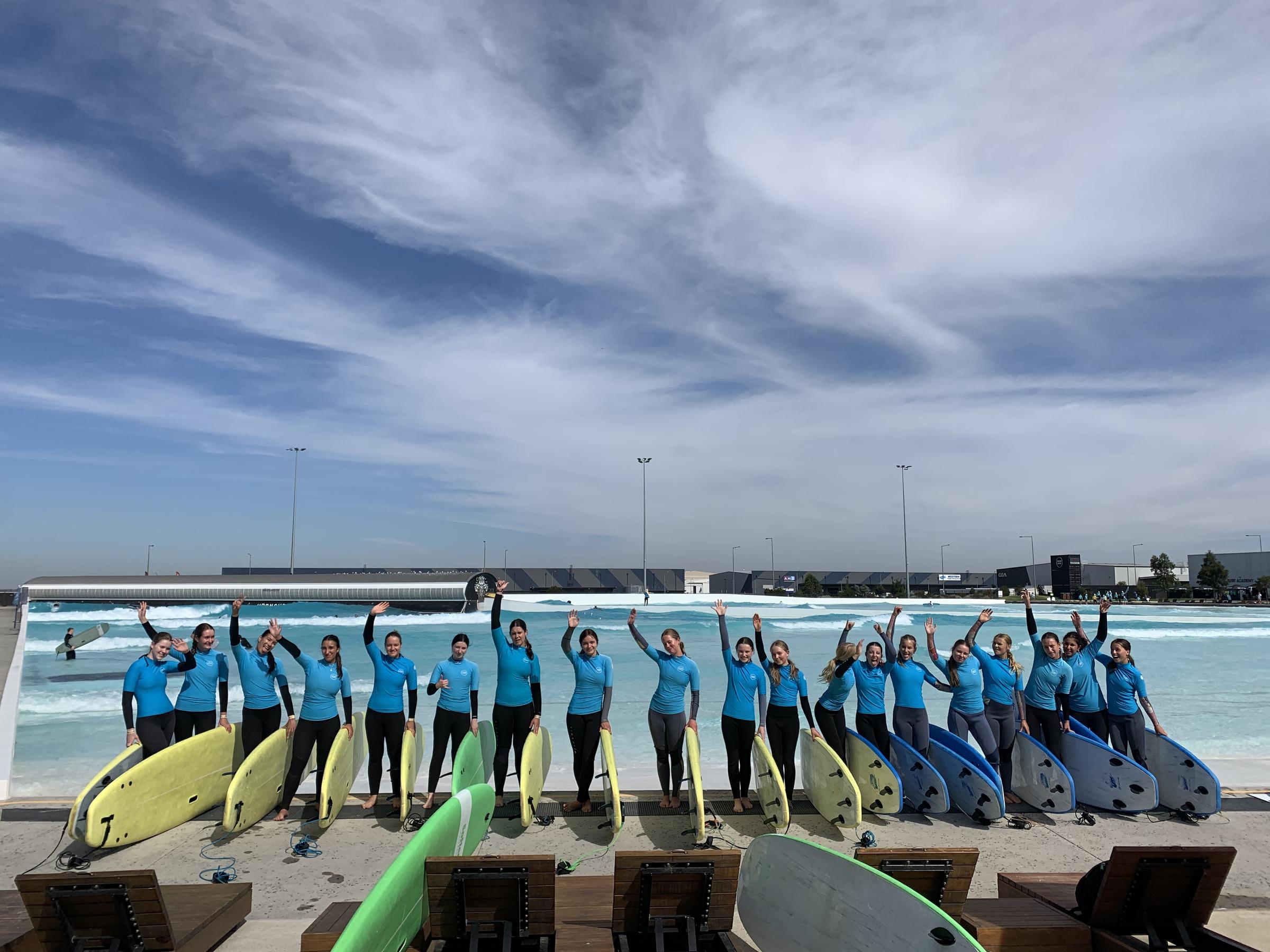Health, Physical Education & Outdoor Education

Core Health and Physical Education is compulsory.
Unit / Subjects | |
Compulsory | Health & Physical Education |
Elective | Healthy Minds, Healthy Habits |
Inside the Human Body | |
Sports Coaching | |
Outdoor Education & Environment | |
Accelerated options | VCE Health and Human Development Units 1 & 2 |
VCE Physical Education Units 1 & 2 | |
VCE Outdoor and Enviromental Studies Units 1 & 2 |
Health and Physical Education
Aim
Health and Physical Education aims to promote a healthy and active lifestyle now and in the future. The physical activity classes focus on the important role physical activity, sport and recreation need to play in the lives of all Australians in meeting the Physical Activity and Sedentary Behaviour Guidelines, providing opportunities for students to be challenged, achieve personal growth, enjoyment, and personal fitness.
Content
At Year 10, during Physical Education students are exposed to a variety of sports/ activities in practical sessions including volleyball, basketball, AFL, soccer and netball.
In Health Education, students learn how to take positive action to enhance their own and others’ health, safety, and wellbeing. Students examine the physical, social, emotional, mental, and spiritual dimensions of health and wellbeing, demonstrating a range of health seeking strategies that will support them to access and evaluate health information and services. Health content explores four key areas:
- Body & Mind
- Respectful Relationships
- Safety
- Youth Health
Assessment
Assessment involves the satisfactory completion of health curriculum and practical activities. Students will be assessed on their work habits including; participation, attitude, collaboration skills, preparedness and use of class time.
Healthy Minds, Healthy Habits
Aim
To increase awareness of students living in the 21st Century and the importance of learning how to look after themselves and each other.
Content
The elective includes investigating:
- Women’s Health Issues: students research issues which affect women worldwide eg sexual exploitation, mental health issues, sexual identity, ovarian cancer
- Pregnancy: Students will learn how to care for a virtual baby and Issues related to unplanned pregnancy.
- Health and Wellness: Students look at the conditions required for health improvement, as stated by the World Health Organization (WHO). They will gain a greater understanding of the dimensions of health and the importance of these in our everyday life.
This subject is recommended for any students interested in completing VCE Health & Human Development.
Assessment
There are three Common Assessment Tasks for this subject: Letter to a Friend, Virtual Baby Vlog, Women’s Health Issue presentation.
It is expected that all students take care of the virtual baby for two nights/three days or over a weekend.
Inside the Human Body
Aim
This unit is a study of the human body, including functioning and structure of the muscular, skeletal, cardiovascular and respiratory systems.
Content
- Anatomy – Study of the skeletal, muscular, circulatory, and respiratory systems.
- Physiology – How the circulatory and respiratory system works and the effects of exercise on the circulatory system. A look at posture, the possible defects and how to improve these defects through exercise.
Practical Component
- Laboratories – Practical application of theoretical knowledge.
- There will be approximately one lesson every week involving a practical class.
Assessment
There are three Common Assessment Tasks in this subject: Developing a Model of a Synovial Joint, Muscular System Test, Cardiovascular System Investigation.
Sports Coaching
Aim
This study area develops an understanding of how to coach a sporting team, awareness of different coaching styles and techniques. It will incorporate the psychology of sport as well as the responsibility a coach has in terms of safety and injury prevention. Students will continue to develop skills and complete practical activities to create lifelong habits. This subject will have a large practical component.
Content
Sports Coaching
Focus on several aspects of good coaching techniques: planning training sessions; role of a coach, conditioning the athlete; communication; skill development; group management; sports safety. This knowledge is then used to address the issue of modifying sports for young children and those with disabilities.
Psychology
Focus on mental training including arousal and relaxation, visualisation and mental rehearsal, motivation, goal setting, dealing with anxiety, developing a positive mental attitude and the psychological responses to sporting injuries.
Practical Component
- Practical Session: Participation in activities including a variety of traditional sports such as netball and basketball, and mostly minor games
- Laboratory session: These include coaching junior classes, peer coaching, taking people with disabilities for an exercise session (if able to make the arrangements with the organization), AFL umpiring course ( with the opportunity to umpire at the MCG at half-time for Auskick)
Assessment
Assessment will include practical participation in all activities, Planning and implementing a school-based coaching session. Plan and implement a coaching session for primary school students and students with disabilities. Laboratory reports, semester tests and a sports injury project.
Outdoor Education
At Year 10 students have two choices for Outdoor Education. Students can only select one of the options below.
- Outdoor Education - One Semester elective
- VCE Units 1 & 2 Outdoor & Environmental Studies - Whole year VCE subject
Option 1: Year 10 Outdoor Education Semester Elective
This option is for students that are interested in spending a semester exploring the outdoors, this is just a semester based elective.
Option 2: VCE Unit 1 & 2 Outdoor & Environmental studies
This option is for students wishing to complete Outdoor Education as a higher study, this will lead into Unit 3/4 Outdoor & Environmental studies in Year 11. Please note, the Unit 3 & 4 VCE subject can only be completed in Year 11 due to excursion and camp requirements.
Please note: All Outdoor Education courses incur a subject fee to cover the cost of camps and excursions.
Year 10 Outdoor Education
Aim
To increase our appreciation of the great outdoors, students will engage in adventurous activities as a way of exploring self and nature, and apply lessons learned to everyday living. This unit aims to develop awareness of our natural environments, land management strategies and our Indigenous heritage and use of the land. Students will develop their knowledge of equipment, basic skill acquisition and address the relevant issues of safety and first aid. Students develop an understanding of the impact of decision making on natural environments through investigation of issues relating to conservation.
Content
- Personal outdoor experiences: study of the reasons people participate in the outdoor environment, including how technology has supported these interactions.
- Sustainable environments: study of the different types of environments across Victoria and how humans can contribute to better levels of sustainability within and across environments.
- Indigenous Australian Land management strategies: native flora and fauna and exploring sustainable farming.
- Adventure activities : participation, risk management and skill development.
Practical Component
Students will participate in a number of activities across the semester including a three-day adventure camp, high ropes course, hiking, rock climbing, surfing, archery, and field trips to study the native flora and fauna.
Assessment
There are three different CATs: Adventure Journal, Design a Camp project and an Environmental Investigation Research Task.
Please note: This subject is a lead into the Unit 3 & 4 Outdoor & Environmental Studies course that can be completed in Year 11.
VCE Outdoor & Environmental Studies
This Units 1 & 2 of this course are only available to Year 10 students.
Practical Component
This subject will involve practical activities and two camps. These activities form part of the formal assessment.
Unit 1: Connections with outdoor environments
This unit examines some of the ways in which Indigenous peoples and non-Indigenous peoples understand and relate to nature through experiencing outdoor environments. The focus is on individuals and their personal responses to experiencing outdoor environments.
Students are provided with the opportunity to explore the many ways in which nature is understood and perceived. Students develop a clear understanding of the range of motivations for interacting with outdoor environments, the factors that affect an individual’s access to experiencing outdoor environments and how they connect with outdoor environments.
Through outdoor experiences, students develop practical skills and knowledge to help them act sustainably in outdoor environments. Students understand the links between practical experiences and theoretical investigations, gaining insight into a variety of responses to, and relationships with, nature.
On completion of this unit students should be able to:
- Analyse motivations for experiencing outdoor environments and plan to safely participate in specific outdoor experiences.
- Explain factors that influence personal responses and access to outdoor experiences and interact sustainably with outdoor environments.
- Evaluate strategies for safe and sustainable participation in outdoor experiences.
Unit 2: Discovering outdoor environments
This unit focuses on the different ways to understand outdoor environments and the impact of humans on outdoor environments.
In this unit students study the effects of natural changes and impacts of land management practices on the sustainability of outdoor environments by examining a number of case studies of specific outdoor environments, including areas where there is evidence of human intervention.
Students develop the practical skills required to minimise the impact of humans on outdoor environments. They comprehend a range of vocational perspectives that inform human use of outdoor environments. Through reflecting upon their experiences of outdoor environments, students make comparisons between outdoor environments, as well as develop theoretical knowledge about natural environments.
On completion of this unit the student should be able to
- Describe a range of outdoor environments and the effects of natural changes with reference to specific outdoor experiences.
- Evaluate the impacts of humans on outdoor environments and associated management strategies, with reference to specific outdoor experiences.
- Participate in a range of outdoor experiences safely and sustainably in an independent manner.
See VCE Outdoor and Environmental Studies for information on all Units.
VCE Health & Human Development
VCE Physical Education
